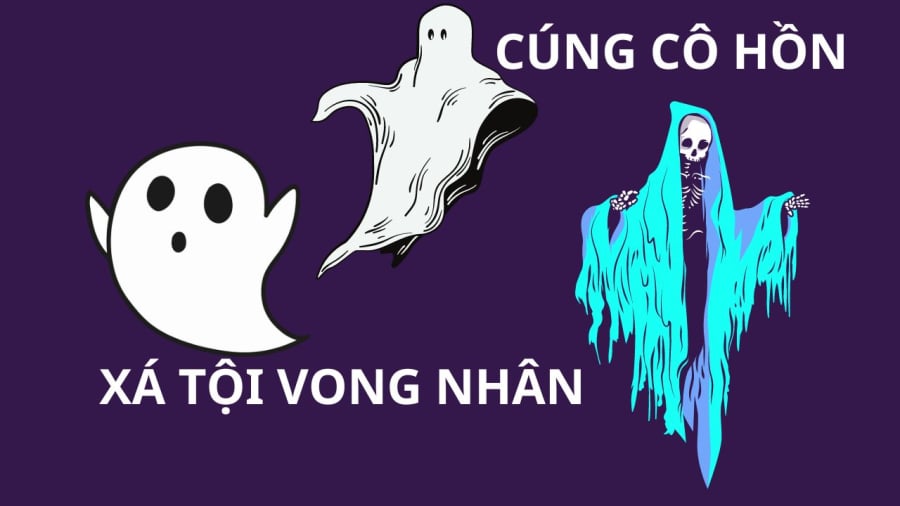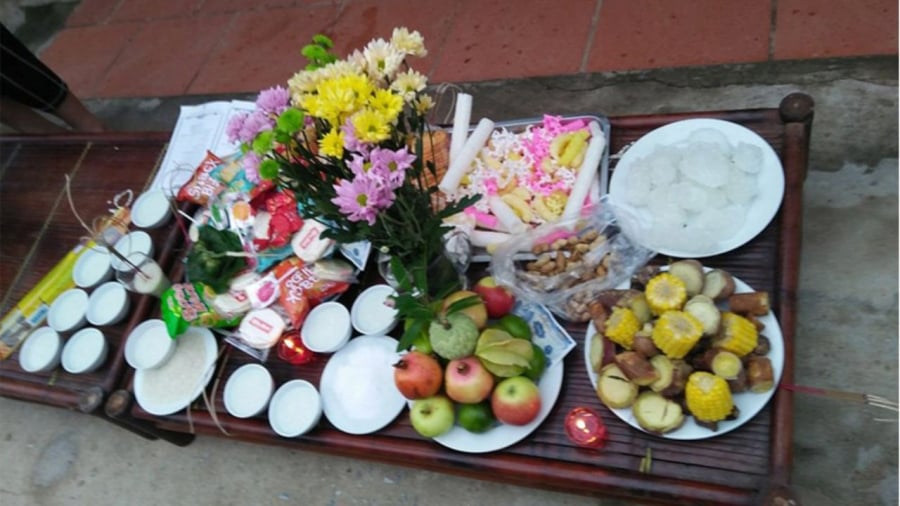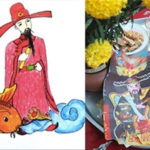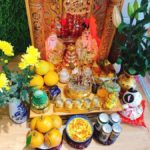The seventh month of the lunar calendar is known in Vietnamese folklore as the “month of wandering souls,” or the “month when King Yama opens the gates of hell.” It is believed that during this month, countless wandering souls roam the earthly realm. Especially on the full moon of the seventh month, the custom of offering alms to these souls has become widespread among the people. In recent years, offerings have been made sporadically from the first to the full moon.

Seventh Lunar Month Associated with Belief in Wandering Hungry Ghosts
In the book “Tục Thờ Cúng của Người Việt” (Customs and Worship of the Vietnamese) by author Bui Xuan My, he states: “According to traditional beliefs, on the full moon of the seventh month, the sinners in the underworld are granted a day of amnesty. Therefore, families in the mortal world prepare offerings, burn votive paper, and recite prayers to show their respect for their ancestors.”
According to China Highlights, the seventh month of the lunar calendar is when the gates of the underworld are opened, allowing souls to return to the living world. Folk beliefs in China hold that the full moon of the seventh month is the birthday of the Great Emperor of the Underworld, and so the gates of hell are opened to allow ghosts and wandering souls to roam the earth.
Some explain the seventh lunar month from the perspective of Eastern metaphysics. According to this school of thought, the seventh month is the ninth month when counted from the first month of the Vietnamese calendar (Tet). Based on the nine palaces of the Luo River diagram, the seventh month falls into the central palace, corresponding to the number 10 of the Heavenly Stem ‘Quý,’ which belongs to the water element. This month has the Yin Water Heavenly Stem and the ‘Quý’ Heavenly Stem governing the central palace. Therefore, according to Vietnamese metaphysics, this month is filled with strong yin energy.
Regardless of the perspective, the seventh month of the lunar calendar is believed to be a month of strong yin energy, with numerous wandering hungry ghosts. This belief has led to the notion that the seventh lunar month is the most frightening month of the year, especially for those in business.
The full moon of the seventh month is also known as the “day of pardoning the dead.” People set up offerings for lost souls outdoors, by the roadside, or in wastelands. These offerings are usually simple, including items such as rice crackers, puffed rice cakes, corn, sweet potatoes, and boiled eggs.
Folk beliefs hold that because the gates of hell are opened during this month, wandering souls roam freely, causing trouble for the living. Therefore, in addition to offerings and rituals at ancestral altars, people also set up offerings for these souls at bridges, restaurants, communal houses, and temples, known as “cháo” (porridge) offerings.
One notable difference in these offerings is the presence of thin porridge, believed to be easier for souls with heavy karma to consume due to their narrow throats. This belief is also said to originate from the story of Muc Kien Lien rescuing his mother from hell. Thus, the seventh month of the lunar calendar is also a time for children to express their filial piety to their parents.

Offerings for Wandering Souls
Does the tradition of offering alms to wandering souls originate from China?
Many scholars and researchers assert that the tradition of offering alms during the seventh month is not necessarily derived from Chinese culture. Similar beliefs and traditions can be found in other cultures, such as India, Cambodia, and Japan, and these may even predate Buddhism.
There is also a folk legend about King Yama, the ruler of hell, opening the gates of hell and allowing some souls to partake in the offerings made by the living. In English, the “month of wandering souls” is known as the “Ghost Month.”
According to YahooLife, the tradition is a blend of Taoist and Buddhist cultural influences. Depending on the region and beliefs, the way people offer alms to wandering souls varies. Taoist practices focus on appeasing the wandering souls, while Buddhist traditions emphasize expressing filial piety and remembering ancestors.
In Northern Vietnam, the full moon of the seventh month is primarily about pardoning the dead, while in Central and Southern Vietnam, it is more about the Vu Lan festival, a time to express gratitude and respect for one’s parents. Recently, Buddhists in the North have also started to emphasize the season of Vu Lan, celebrating filial piety.
There are various interpretations of the customs and beliefs associated with the seventh month of the lunar calendar. Nonetheless, researchers agree that these traditions embody noble humanitarian values, emphasizing filial piety, kindness, and understanding the concept of karma to lead a better life.
3 Taboos for Worshipping on the Full Moon of January, Homeowners Beware of Losing Fortune
On the fifteenth day of the first lunar month, many families meticulously prepare a ceremonial feast. Regardless of whether the feast is grand or small, elaborate or simple, it is important to understand certain taboos. These taboos should be understood logically and scientifically by the host in order to seek good luck smoothly.





































